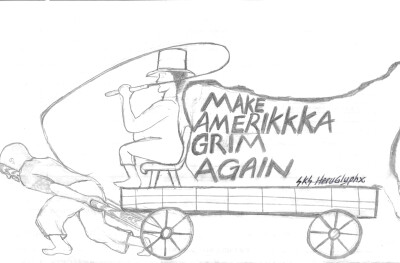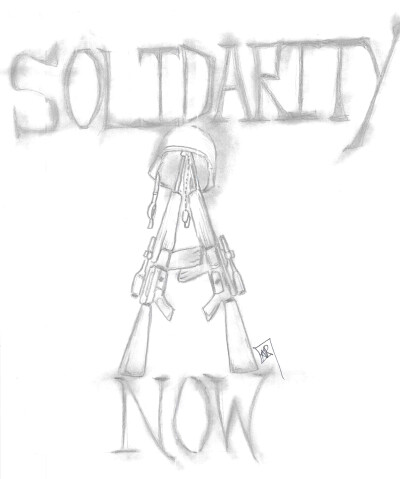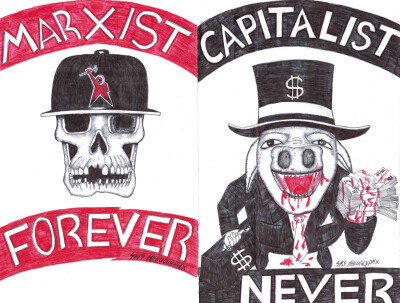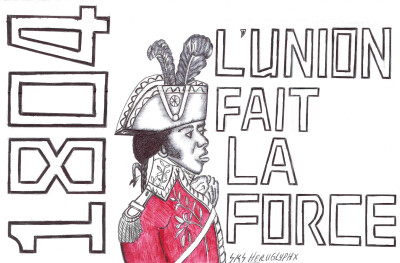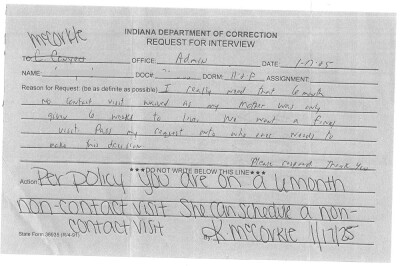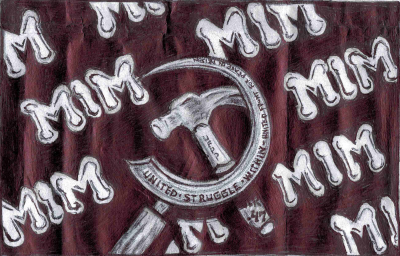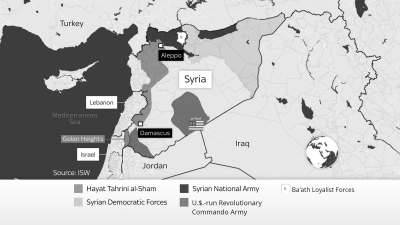MIM recognizes the Black Panther Party for Self-Defense (BPP) as the
most advanced communist vanguard to have existed in North America.
Specifically, we uphold the BPP from 1966 to 1970. For our analysis of
the BPP see our study pack Defend the Legacy of the BPP.
12 January 1865: During the Civil War 20 New Afrikan leaders meet
with General Sherman of the Union. 19 of the 20 state that they prefer
to live separate from the United $tates. Initially land in the south was
given to New Afrikans with the Union victory, but when President Andrew
Johnson came to power ey re-established Euro-Amerikan rule in the
south.
1914: Marcus Garvey founds the Universal Negro Improvement
Association (UNIA), a pan-Afrikan, pro-capitalist movement that
recognized Euro-Amerikans would never live with New Afrikans as equals.
UNIA organized 5 million followers in a movement to return to Afrika and
built a number of successful businesses before Garvey was arrested in
1925 and deported to Jamaica.
1917: The African Black Brotherhood (ABB) for African Liberation and
Redemption formed as the first Marxist Revolutionary Black nationalist
organization in the United $tates, at a time when a free New Afrikan
proletariat was migrating from the south to urban centers. The ABB
merges into the American Communist Party in the late 1920s.
1952: Malcolm X, a son of Garveyite parents, is paroled from prison
and immediately begins organizing with the Nation of Islam, quickly
becoming its most influential leader, until ey is expelled in 1964.
1962: Huey P. Newton meets Bobby Seale at a rally at Merritt College
opposing the blockade of Cuba. The Revolutionary Action Movement (RAM)
is founded by “revolutionary Black nationalists” (including Max
Stanford) seeking to organize an armed struggle to win national
liberation for the “colonized Black nation” based in Marxism-Leninism
and inspired by Mao Zedong and Malcolm X.
1963: RAM goes underground. Mao Zedong puts out an essay calling on
support for Black Liberation Struggle at the behest of Robert F.
Williams who was in China in exile after first going to Cuba in 1961 to
avoid legal attacks by the U.$. imperialists.
1964: RAM develops armed self-defense units with Student Non-Violent
Coordinating Committee (SNCC) in the Mississippi delta region. Malcolm X
becomes a RAM officer and travels through Africa building support.
28 June 1964: Malcolm X (now el-Hajj Malik el-Shabazz) returns from
Africa and forms the Organization of Afro-American Unity (OAAU) with
John Henrik Clarke, the OAAU was to be the broad front organization for
the now underground Marxist cadre organization RAM.
21 February 1965: Malcolm X is assassinated. Bobby Seale swears to
“make his own self into a motherfucking Malcolm X.”
August 1965: Watts rebellion breaks out in Watts, California, after
two New Afrikan stepbrothers and their mother are subject to violence
from a white pig. Both cops and white citizens of Watts are beaten by
New Afrikans, riots break out throughout the city, and the National
Guard are sent in.
1966: Seale leaves RAM, to work with Newton, over lack of material
support against police brutality and “inability to organize brothers on
the block.” Seale disagrees with RAM’s insistence on the revolutionary
vanguard being clandestine. This is later addressed by Newton in the
essay, “The Correct Handling of a Revolution” (1967).
1966-67: Newton and Seale adopt the imagery of a black panther, sell
Little Red Books to purchase guns, and rent an office for the first
chapter of the Black Panther Party for Self-Defense, at the time an
armed group in confrontation with police.
21 February 1967: Eldridge Cleaver and the RAM-affiliated Black
Panther Party of Northern California hold a memorial for Malcolm X.
Seale, Newton, and other Panthers provide an armed security detail for
Betty Shabazz, his widow. Newton says their ability to stand up to
police at the event finally convinced Cleaver to join the BPP.
April 1967: The Panthers begin organizing in North Richmond, holding
two armed rallies and distributing newspapers informing about the murder
of Denzil Dowell by the pigs and the need for armed self-defense.
2 May 1967: A delegation of thirty Panthers go to Sacramento to
challenge the passing of a new bill prohibiting carrying arms in public.
Twenty-four New Afrikans are accosted and arrested on the way home – 22
armed Panthers, as well as unarmed Eldridge Cleaver and an unarmed,
unaffiliated New Afrikan passerby.
May 1967: The Black Panthers publish their Ten Point Program, laying
out what they believe and what their demands for New Afrika are.
12 July 1967: Rioting breaks out in Newark, NJ, a majority-New
Afrikan city under oppressor-nation control, after a New Afrikan cab
driver is beaten too badly to walk. Molotov cocktails are thrown and
businesses are looted as the rebellion grows. Twenty-one New Afrikans
are murdered by police.
23 July 1967: Urban rebellion breaks out in Detroit, MI, going beyond
looting to tactics such as arson and sniping. 33 New Afrikans are
killed, as well as ten whites, many of them government officials.
27 October 1967: Newton shoots notorious racist pig John Frey,
killing him; Frey shoots Newton in the stomach. Newton’s trial for the
murder of Officer Frey sparks the “Free Huey!” movement, wherein Newton
is presented as resisting the perpetration of violence against New
Afrikans by the occupying-force pigs.
17 October 1967: White youth radicals protest the draft in Oakland,
attempting to shut down the induction center, and are met with violent
repression. Further rallies and riots against the draft eventually merge
with the “Free Huey!” campaign, among both the white and New Afrikan
left.
1968: RAM disbands and decides to coordinate through other groups
such as the Black Liberation Party, African Peoples’ Party and House of
Umoja. BPP rules state: “no party member can join any army force other
than the Black Liberation Army.”
28 January 1968: Seale gives a speech at a UC Berkeley rally linking
the struggles of anti-draft protestors with police brutality against New
Afrikans.
31 March 1968: Malcolm X Society hosts 500 New Afrikan nationalists
for the Black Government Conference in Detroit; they initiate the
Provisional Government of the Republic of New Afika (PG-RNA) to be
composed of Alabama, Georgia, Louisiana, Mississippi and South
Carolina.
4 April 1968: Martin Luther King Jr. is martyred in Memphis,
Tennessee. Rebellion erupts in Memphis, and then sweeps New Afrikan
neighborhoods. The Panthers play a role in quelling riots in many cities
to encourage more organized rebellion.
6 April 1968: Lil’ Bobby Hutton, a 17-year-old Black Panther, is
martyred by police in West Oakland while doing armed pig patrols with
Eldridge Cleaver.
8 September 1968: FBI Director J. Edgar Hoover designates the BPP as
“the greatest threat to the internal security of the country.”
Fall 1968: Cleaver goes into exile in Cuba.
17 January 1969: Los Angeles chapter leaders Bunchy Carter and John
Huggins shot and killed by US organization members on UCLA campus,
provoked by FBI interference. BPP leadership institutes a policy to
expel those in clandestine military formations. Geronimo ji Jaga Pratt,
with eir experience in the U.$. military, takes Carter’s position as
Southern California Minister of Defense and begins building chapters
across the south while developing underground cadre units as well
July 1969: BPP hosts Revolutionary Conference for a United Front
Against Fascism conference in response to others looking to them for
leadership, bringing together 4,000 activists, majority Euro-Amerikan.
Bobby Seale stresses class struggle and condemns Black racism. The
conference creates National Committees to Combat Fascism across the
country under BPP leadership that focus on control of the police and
freeing political prisoners. Cleaver appears publicly in Algiers,
Algeria where ey will establish the BPP international office.
5 November 1969: Seale sentenced to four years in prison for sixteen
counts of contempt, because of his outbursts during the trial.
Originally being tried as part of the Chicago 8 for “inciting a riot” at
the Democratic National Convention in Chicago, ey was bound and gagged
during the trial. Seale was released in 1972.
4 December 1969: Fred Hampton, leader of the Chicago chapter, is
assassinated by Chicago police and FBI. The pigs killed Hampton as ey
was successfully uniting lumpen organizations in Chicago of different
nationalities in the original Rainbow Coalition. The BPP was also in the
process of expanding the Central Committee beyond the trusted founders
in Oakland to include leaders like Hampton. This never happened and
contributed to the splitting of the party over regional differences.
1969: Los Angeles pioneers the first-ever Special Weapon Assault
Team, or SWAT, against BPP office building in L.A.
July-August 1970: Eldridge Cleaver and Elaine Brown join a delegation
of people from the U.$. visiting North Vietnam, North Korea and
China.
5 August 1970: Huey P. Newton is acquitted and released from prison,
taking control of the underground military operation that was built
while ey was incarcerated.
7 August 1970: Jonathan Jackson is killed at the Marin County
Courthouse attempting to free eir brother George Jackson.
August 1970: Geronimo ji Jaga Pratt goes underground to develop BLA
and establish guerrilla bases, with support of the party.
October 1970: People’s Republic of China Premier Zhou Enlai hosts
Newton, Elaine Brown and other Panthers. Tens of thousands gather in
Tiananmen Square to honor their visit They also visit Jiang Qing.
December 1970: Newton and Elaine Brown send Melvin “Cotton” Smith, a
secret police informant, to Dallas to meet with Pratt.
8 December 1970: Pratt, Will Stanford, Will “Crutch” Holiday, and
George Lloyd arrested in Dallas; Cotton is arrested shortly after as
well.
1971: The BPP splits.
January 1971: Newton and Brown publicly denounce Pratt and others
arrested in Dallas for counter-revolutionary behavior. Panther 21 (NYC)
issue statement from prison supporting Weather Underground, condemning
BPP for ignoring Panther 21 and Weather.
23 January 1971: Newton publishes his theory of “intercommunalism”
arguing that nations and national liberation were no longer relevant in
global capitalism, which ey introduced at a speech at Boston College in
November 1970 following release from prison.
28 January 1971: FBI offices in Boston, NY, LA and San Francisco
receive memo to capitalize on the rift over armed struggle within
BPP.
13 February 1971: NY Panthers Michael Tabor, Dhoruba Bin Wahad and
Connie Matthews were expelled after they went underground.
26 February 1971: Newton and Cleaver (in Algiers) have a phone
conversation on live TV that ends with Cleaver calling for the
reinstatement of expelled members from NYC and LA and the resignation of
David Hilliard as Chief of Staff. Newton follows up by calling Algiers
and expelling all Panthers at the BPP International office. Elaine Brown
replaces Eldridge Cleaver on the Central Committee of the BPP.
3 April 1971: Cleaver faction begins publishing own newspaper
Right On! calling for insurrection as The Black
Panther newspaper moves away from calling for “revolution now.”
17 April 1971: Newton puts out statement “On the Defection of
Eldridge Cleaver…” stating that “We will never run for political
office…”
19 May 1971: On the 46th birthday of Malcolm X the BLA shoots two
cops protecting the house of the NY District Attorney in charge of
prosecuting the Panther 21.
18 August 1971: FBI and police raid headquarters of the Provisional
Government of the Republic of New Afrika in Mississippi.
21 August 1971: Field Marshall George Jackson is killed by guards at
San Quentin State Prison in California. BLA carries out multiple
retaliatory attacks on police in San Francisco, and ends support for
clandestine military action in Oakland.
1971-1973: 2 years following split the FBI would attribute 20 police
deaths to the BLA, while claiming police killed 7 BLA members and
imprisoned 18 key members. In 1971 the BLA calls for a strategic
retreat, but it is too late for many and the organization is too
decentralized to pull back.
1972: Bobby Seale released from prison, but at by this time the BPP
was becoming little more than a local community organization in Oakland.
“Afro-American Liberation Army” used in place of BLA in Humanity
Freedom Peace in 1972 – reprinting essays by Geronimo Pratt. AALA
claims action in Los Angeles.
1973: Elaine Brown runs for Oakland City Council.
1973: In the two years after the BPP split, the U.$. government
attributed the deaths of 20 police officers to the BLA.
14 November 1973: Police kill Twyman Meyers in an ambush in the
Bronx, after which they declared they had “broken the back” of the
BLA.
1974: Huey Newton flees to Cuba to avoid criminal charges and Brown
takes over as chair of the BPP securing federal and foundation funding
for its programs.
1975: Between 1973 and 1975, the FBI claims responsibility for 7
assassinations and the capture of 18 other BLA members.
1975: Imprisoned BLA members sum up last four years in report
“Message to the Black Movement” that says, “we lacked a strong
ideological base and political base,” and initiated the BLA –
Coordinating Committee (BLA-CC), publishing a newsletter circulated in
prisons. By this time, BPP chapters with links to the BLA have no
above-ground presence.
1977: Newton returns from Cuba, Brown resigns from the BPP after an
incident where Newton supported male members of the party who assaulted
a womyn in the party in retaliation for the womyn reprimanding a male
member for lack of discipline.
2 November 1979: BLA members successfully break Assata Shakur out of
prison.
1980: NYPD and FBI form the Joint Terrorist Task Force (JTTF) to
coordinate search for Assata and to smash the BLA.
1981: Brinks truck holdup with BLA and Weather members involved led
to other militants getting targeted, proving that BLA still had strong
membership years after big raids. The Joint Terrorist Task Force would
go on to conclude that the Revolutionary Armed Task Force (including
Weather and BLA members) had conducted many robberies throughout the
late 1970s.
December 1981: Last known action of the BLA according to the
JTTF.
June 1982: Black Panther Party closes its last office.
November 1993: Former BLA members issue public call to form a New
Afrikan Liberation Front.
March 1998: the NALF and PGRNA-sponsored Jericho ’98 mobilized at
least 5000 people around the country for political freedom for
nationalist-related prisoner organizing.
Sources: * Triumphant, Black August 2022, Power to New
Afrika, MIM Distributors. * Akinyele Umoja, June 1999, “Repression
breeds resistance: The black liberation army and the radical legacy of
the black panther party, New Political Science. * Joshua Bloom
and Waldo E. Martin, Jr., 2013, Black Against Empire: The History
and Politics of the Black Panther Party, UC Press, Berkeley.

